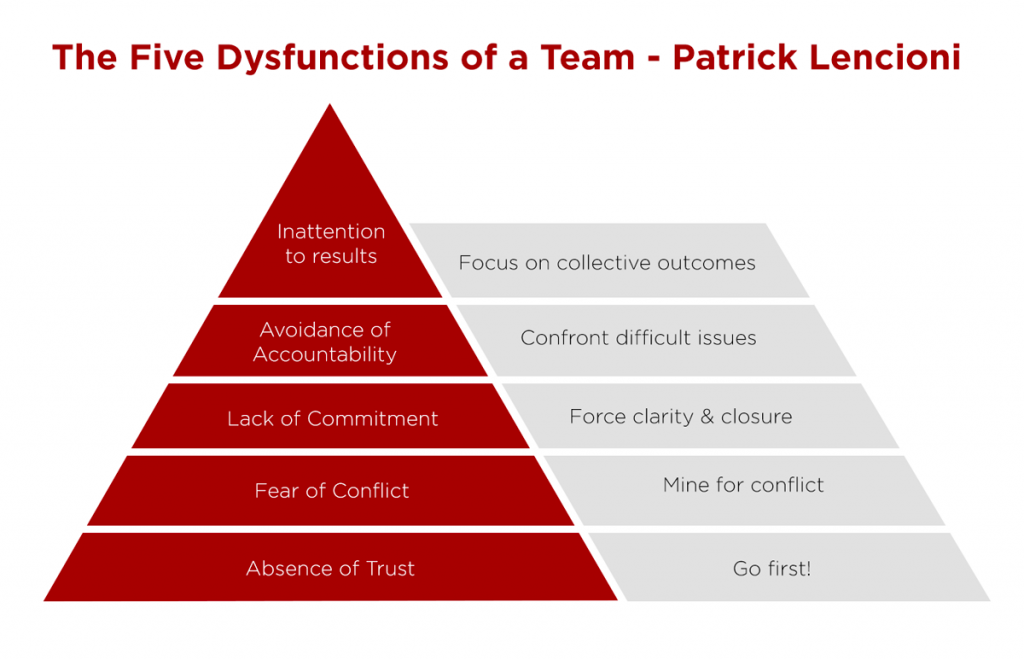A high performance team is your organisation's ultimate secret weapon. Imagine if you could get all the people in your organisation rowing in the same direction - you could dominate any industry, in any market, against any competition, at any time!
Patrick Lencioni is a well-known business management author, who has coached thousands of management teams and CEOs. His 'Five Dysfunctions of a Team' framework is very relevant for understanding how to build a high-performing team. By looking at what makes a dysfunctional team, we can understand how each behaviour leverages off the next and that by doing the opposite, we can build a world-dominating team.
Lencioni's Five Dysfunctions of a team:
1) Absence of Trust
The fear of being vulnerable with team members prevents the building of trust within the team. Vulnerability-based trust is characterised by such things as saying ‘I need help,’ ‘I screwed up' or 'I made an error.’
Solution: Build trust into your team culture by creating an environment of being open and honest, sharing problems, admitting mistakes and assisting each other in a collaborative manner.
2) Fear of Conflict
The desire to preserve artificial harmony stifles productive, ideological conflict. This creates two problems. Firstly, stifling conflict actually increases the likelihood of destructive, back channel sniping. Secondly, it leads to sub-optimal decision-making because the team is not benefitting from the true ideas and perspectives of its members.
Solution: Welcome productive conflict in your team. Challenge paradigms, encourage others to speak up or out, get input from the team and confront issues quickly. But remember, productive and constructive conflict cannot happen without trust!
3) Lack of Commitment
The lack of clarity or buy-in prevents team members from making decisions they will stick to. People give up or check out because either artificial harmony on one extreme, or destructive harmony at the other extreme leads to an environment of either fear or fantasy.
Solution: With trust and healthy conflict built into your team culture, engage your team by ensuring you are aligned on common objectives and being clear on direction and priorities.
4) Avoidance of Accountability
The need to avoid interpersonal discomfort prevents team members from holding one another accountable for their behaviours and performance. It’s too hard and emotionally draining to be constructively direct with a peer.
Solution: By now, you should have trust, productive conflict and commitment in your team. Accountability is the natural next step. Implementing the same standard for everyone and having clarity over these standards is essential. Team members should be made to feel comfortable to take accountability and to hold each other accountable, even if it is difficult. Likewise, a high performing team also recognises each others' performance with praise or rewards.
5) Inattention to Results
The pursuit of individual goals and personal status erodes the focus on collective success. By not focussing on results, you're more likely to see poor performance and higher team turnover.
Solution: With a team now built on trust, healthy conflict, commitment and accountability, the final tip of the pyramid is focussing on results. Results-focussed teams are more highly motivated. Of course, there are a multitude of benefits to having a highly motivated team - one being that you'll be likely to see reduced staff turnover.

So now, if we step back and look at the flip side of each of these five dysfunctions, we can see the characteristics of a High Performance Team:
- High levels of trust
- Constructive and productive conflict within the team and between peers
- Deep commitment and engagement with the cause or strategy
- Good levels of a willingness to hold each other to account
- Strong and enduring results orientation
If you're a leader of a team, commit to addressing the five dysfunctions and see what an enduring difference it makes to your team's culture, performance and motivation.
For more information, ask us about how we can help improve or boost your team culture.